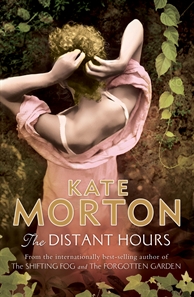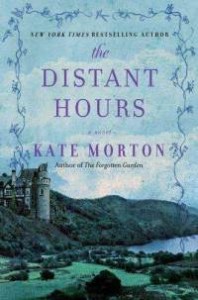 This is the third novel by the very successful Australian author Kate Morton. Her first book The Shifting Fog was an international bestseller and this was followed by The Forgotten Garden. Morton’s novels might be called literary mystery romances and they centre around family secrets that play out over generations.
This is the third novel by the very successful Australian author Kate Morton. Her first book The Shifting Fog was an international bestseller and this was followed by The Forgotten Garden. Morton’s novels might be called literary mystery romances and they centre around family secrets that play out over generations.
I didn’t read The Shifting Fog feeling suspicious of a book that was over promoted. I did buy The Forgotten Garden (who could resist that title) but it languished on my bookshelf for some reason. Then The Distant Hours came along and the blurb was too irresistable.
Elderly sisters living in a castle, their reclusive father, Raymond Blythe, a famous author, a long lost letter that connects our heroine’s mother to the castle, a tragic romance causing insanity, mysterious deaths etc etc
At the time I bought it The Distant Hours was only for sale in hard copy in Austalia (huh? that usually happens only for a beautifully produced lit fiction title, or that last Harry Potter) so I bought it as an ebook. This worked out very well as I didn’t have to lug a 600 page book around on holidays.
On the whole I enjoyed the novel but found it very patchy as if a different author had written various parts, and the plot was very convoluted with turns upon turns upon turns. Add to this different time frames and numerous points of view and I found myself exasperated in parts and bored with the overly detailed narrative in others.
 This is a pity because Morton can write very effectively. Her portrayal of the dynamics of the relationship of the Blythe sisters is acute – the stiff, controlling but quite funny Percy, the seemingly soft and yielding but, in reality, tougher than she seems Saffy, and the fey and unwordly Juniper is wonderfully done especially in the long section near the beginning set in 1941 when they are waiting at the castle for Juniper to return from London with a ‘young man’.
This is a pity because Morton can write very effectively. Her portrayal of the dynamics of the relationship of the Blythe sisters is acute – the stiff, controlling but quite funny Percy, the seemingly soft and yielding but, in reality, tougher than she seems Saffy, and the fey and unwordly Juniper is wonderfully done especially in the long section near the beginning set in 1941 when they are waiting at the castle for Juniper to return from London with a ‘young man’.
The period (wartime) setting of the novel is effectively evoked as is the moody, crumbling castle but I found some of the ‘contemporary’ (though in reality this section is set in the early 1990s) narrative forced and annoying. Why on earth our heroine Edie’s father comes in to the story as he takes an interest from his sick bed in Raymond Blythe’s Gothic children’s book The True History of the Mud Man is beyond me.
And it is really Edie’s mother, Meredith, who has a direct link to the castle (and for whatever reason has kept this period of her life secret from her daughter and her husband). But Morton does not choose Meredith, although it is she who has something at stake, but Edie to follow the trail of clues and mystery back to the castle. Perhaps Morton wanted to show Meredith’s boring life as a consequence of decisions she made long ago and thus felt Meredith could not be a compelling enough character, so young, literary Edie is given the role.
There is a trend in genre publishing for these sort of novels that meld the present with the past. Like Edie we, the reader, want to unravel a mystery and Edie becomes our proxy as we follow clues and find out snippets of information. But Morton goes one step further and allows us into the heads of characters in the past so, for example, we see how Percy Blythe feels and acts in the present (through Edie’s eyes) and also how she thinks, feels and acts in the past (although the whole is referred through the modern protagonist of Edie).
I wonder about the extraordinary popularity of these books. Readers don’t merely want to read about a fiction occurring in the past, they want it resolved in the present ie they want total control and everything has to be meaningful to a character, today.
But who am I to quibble? Morton is hugely popular, and readers seem to like the plethora of twists and turns in her plots; and even, it appears, are prepared to overlook the dead ends and the boring, irrelevant bits.

